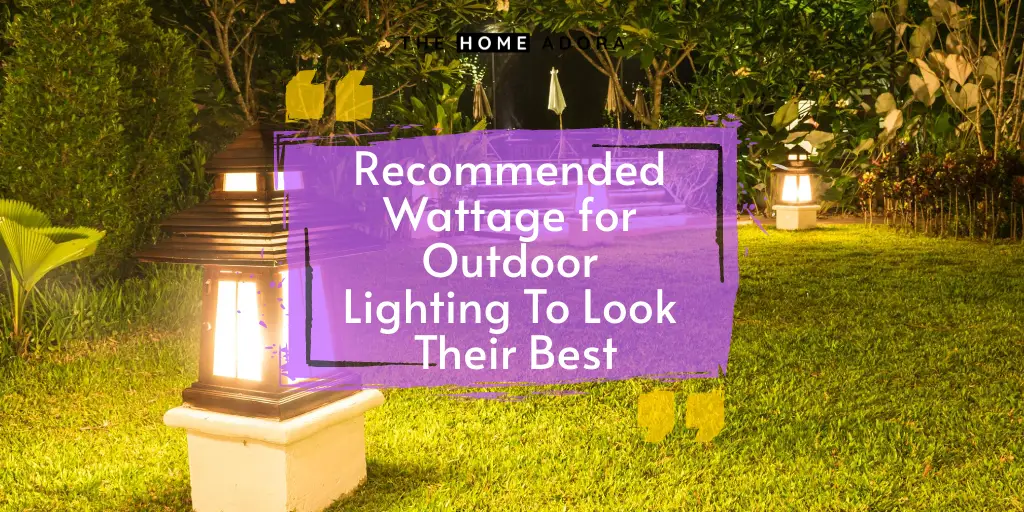You don’t want lights that are too bright or too dim when considering outdoor lighting, which is why understanding the required wattages for outdoor lighting is critical. Choose something too bright, and you’ll have glare and a front yard that looks like it belongs in a jail or an opera theatre.

When you choose anything too dim, you will miss the comfort and security features of outdoor lighting. When deciding on wattage, consider the exact requirements and size of the area to be illuminated.
This article will explain what watts are. You may also learn about the ideal wattage for outdoor lighting and why it matters.
“A Watt” is A conversation between a couple, Happy reading!!
“One watt.” “You know, like how you gauge the wattage of some light bulbs,” Alison says.
“OK,” Ethan says. “I’m still confused about wattage and bulbs.” “Can’t we just replace the bulb and call it a day?” Alison groans. “We could, but a number of things might go wrong.” The bulb may not operate, may not work properly, or may short out. Who knows, it may harm anything.”
As he leans back in his chair, Ethan lets out a low whistle. “That does not sound nice. I believe I should learn more about watts and choose the ideal wattage for outdoor lighting. I believe we should also check into how many lumens we require, however that is an LED bulb issue.”
Alison laughs as she takes out her phone. “This time, I’ll do the searching.” If you like, you may come and watch with me.” As Ethan scoots closer to look, she begins searching on Google.
Eventually, they discovered this:
What Exactly Is A Watt?
A watt is the quantity of energy used by a light bulb. The lesser the wattage, the less energy is used, which means less money spent. A watt measures the rate of energy transmission, according to the technical definition.
The higher the wattage, the more energy you consume. This is one of the reasons why non-LED light bulbs get so hot.
Many use different wattages for different sorts of lighting, so be sure you pick the proper one. We don’t want your lights to burn out prematurely or not turn on at all.
The Best Outdoor Lighting Wattage
Wattages of 80 and below are ideal for outdoor lighting. For pathways, patios, and other low-level locations, 40-watt lights can be used. 40- to 80-watt bulbs are great for illuminating driveways and other parts of your yard. Dark sky illumination is also authorized for bulbs rated at 80 watts or less.

Anything beyond 80 watts is too bright for most household outdoor lights. This is the range of floodlights. For bigger lawns and driveways, you may utilize them as security lights. You can frighten away most predators by attaching them to motion sensors.
Low Wattage Lights
Using low-wattage lights up to 40 watts can help you save energy, decrease light pollution, and focus on the areas you wish to brighten. Furthermore, while your solar illumination options at higher wattages are highly restricted, you may much more readily locate a solar lamp at a modest wattage. Low wattage lights may not provide a lot of light, They’re perfect for accent lighting, fashionable illumination, and making the earth visible. You may also use them in gardens at night to highlight your flora and statuary.
High Wattage Lights
If you want to flood your landscape with light, choose lighting that can support bulbs rated at 80 watts or greater. Roadway lights may be as powerful as 400 watts. This type of lighting is suspended high above the ground, with an opaque “night sky shield” cover, and illuminates a large region.
They illuminate bigger areas such as parking lots, roads, and pedestrian zones. These bulbs may be used to illuminate your yard as well as the yards of your neighbors.
Mid-Range Wattage Lights
Choose a lighting fixture that can handle 40 to 80-watt bulbs to provide soft to moderate illumination in a small yard or driveway. Many landscape light fixture selections fall within this approximate range, with 60 watts being the most frequent.
Select a model that mounts from a post or an arm extending from a high wall to spread this amount of wattage across a large area. Even with this wattage level, you should avoid installing the lights immediately next to any residential windows to avoid unwanted evening glare.
Choosing Outdoor Lighting Wattages
Placing outdoor lights of varying wattages aids in balancing your lighting requirements. Choose lights for different areas of your landscape based on how bright you require the light to be. The varying wattages in the landscaping provide the stronger light required for security and protection while also attracting softer light to highlight highlights without producing glare.
You Might Also Be Interested In
“Wow, it’s a positive idea we’re looking into this, otherwise I might’ve gotten too high of a watt,” Ethan breathes relievedly. Alison gives a nod. “Me as well. Let’s see what else we can learn about outdoor lighting while we’re here.
See More: Outdoor Kitchen Lighting Ideas, Tips & Guides
Frequently Asked Questions
Conclusion
Outdoor lighting can be a great way to improve the security of your home or business. It can also be a great way to improve the appearance of your property. This article provides information on the recommended wattage for outdoor lighting. If you are considering installing outdoor lighting, be sure to comment and share this article with your friends.

